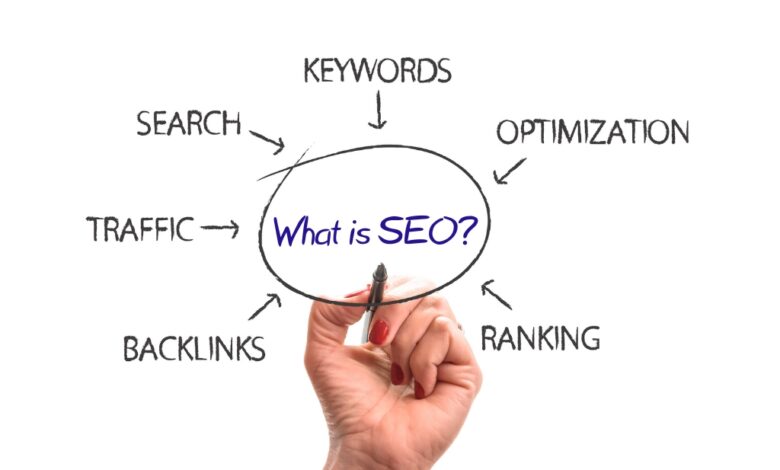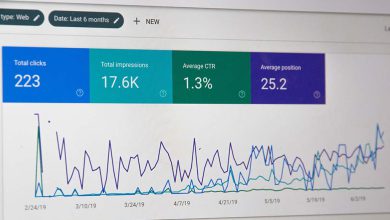What is SEO? An Introduction to Search Engine Optimization

SEO, or search engine optimization, is the lifeblood of digital marketing today. Its importance lay in increasing a website’s visibility, driving organic traffic and boosting conversions. SEO involves an array of techniques and practices that optimize web pages and websites for search engines like Google. In this article, we will delve into the definition of SEO, its core concepts, as well as the significance of both on-page and off-page SEO.
What is SEO and how it works?
SEO is the art of optimizing web pages and websites to rank higher on search engine result pages (SERPs) for specific keywords and phrases. It involves a myriad of best practices including keyword research, content creation, backlink building, and more.
Search engines, particularly Google, play a crucial role in the success of SEO. By deploying complex algorithms, search engines determine which websites deserve to appear at the top of their SERPs. SEO, as a result, aims to optimize websites and their content in a way that helps the algorithms understand what the website stands for and how relevant its content is to the users’ queries.
Backlinks and Keywords are two of the most important concepts in SEO. Keywords are the terms and phrases that users enter into search engines when searching for information, products or services. Backlinks, on the other hand, are links from other websites that direct to your website; indicating to search engines the authority and relevance of your website.
What is On-Page SEO?
On-page SEO refers to a range of techniques and practices that optimize website pages to rank higher on SERPs. These techniques include optimizing the content of the page, as well as its HTML source code and other media elements such as images and videos.
One of the most important on-page SEO elements is meta tag optimization. Meta tags, including meta titles and descriptions, help search engines in understanding the nature of the webpage. The title tag should contain the primary keyword for the page, while the meta description should provide a brief overview of the page’s content.
Keyword density is another crucial on-page SEO factor, referring to how often the keywords appear throughout the webpage content. A high keyword density is considered as keyword stuffing and could result in search engine penalties. Therefore, it’s important to maintain an optimal keyword density to improve the content’s readability and search engine ranking.
What is Off-Page SEO?
Off-page SEO refers to the range of techniques and practices used to boost the authority and credibility of a website through external factors. Link building and social media marketing are the two most common types of off-page SEO.
Backlinks play a major role in off-page SEO as they help search engines to identify a website as a trusted and reliable source of information. High-quality as well as high-quantity backlinks can improve a website’s domain authority, a crucial ranking factor in search engine algorithms.
Social media marketing is another essential component of off-page SEO. Promoting a website and its content on popular social media platforms like Facebook, Twitter and Instagram can increase brand visibility and engagement that lead to more website traffic and authority.
In conclusion, implementing SEO best practices is crucial for any digital marketing campaign’s success. By optimizing on-page and off-page factors, businesses can boost their website’s visibility, generate organic traffic, and with it, boost conversions. Understanding the core concepts and techniques of SEO empowers businesses to develop effective strategies and outperform competitors on the search engine results pages.
What is Local SEO?
Local SEO is the process of optimizing a website or online presence to rank better in search results that are locally-based and relevant to a specific geographic area. Local SEO is particularly important for brick-and-mortar businesses looking to generate sales from their local customers. For instance, if you own a restaurant in Manhattan, you would want your website to appear at the top of the search results for “best restaurants in Manhattan”.
Google My Business (GMB) is an indispensable part of local SEO. It’s a free tool that helps businesses manage their online presence on Google by ensuring that their contact information, hours of operation, and other vital details are correct and up-to-date. By optimizing their GMB profile, businesses can demonstrate their relevance to local search queries for their product or service.
Local keyword research is also vital for local SEO. Businesses should focus on location-specific keywords that are most relevant to their target audience. For example, a bakery in Brooklyn would want to target keywords such as “best Brooklyn bakery” or “bakery in Brooklyn” instead of broader keywords that have lower local relevance.
Customer reviews are another critical aspect of local SEO. Positive feedback from customers indicates to search engines that the business is trustworthy and reliable, which can significantly boost search rankings. To encourage customer reviews, businesses need to provide excellent customer service, make it easy for their customers to leave feedback, and respond quickly to both positive and negative reviews.
What is Technical SEO?
Technical SEO is a crucial aspect of optimization that focuses on the technical elements of a website, including site architecture, crawlability, and page speed. It’s concerned with ensuring that search engines can crawl and index the website effectively, leading to improved visibility and higher traffic.
Site architecture is the way that information is organized and presented on a website. A clear and rational architecture enhances the user experience and makes website navigation easier for search engine crawlers. Features such as a clear sitemap, optimized headings and subheadings, and logical page URLs all contribute to website architecture’s success.
Crawlability refers to how easily search engine spiders can crawl and index a website’s content. Common crawlability issues may include broken links, duplicate content, and pages that have little to no content. Frequent checks for crawl errors and immediate resolution can help improve overall site health and search engine visibility.
Page speed is another vital factor in technical SEO. Slow page load times can lead to poor user experience and negatively affect search engine rankings. Optimizing images, reducing the number of HTTP requests, and minifying code are some common ways to boost page speed and improve search engine rankings.
What is Black Hat SEO?
Black hat SEO techniques attempt to deceive search engines through shady tactics that violate search engine guidelines. These tactics may work in the short-term, but can severely harm a business’s reputation and search engine visibility in the long run.
Keyword stuffing is one of the oldest and most well-known black hat SEO techniques. It involves stuffing a web page with keywords and key phrases in an attempt to manipulate search engine rankings. Unfortunately, this makes content virtually unreadable, hurting the user’s experience and decreasing the likelihood of conversions.
Another tactic used in black hat SEO is cloaking. This involves displaying different content to search engine spiders than what is visible to users. This misleads search engines, leading to artificially increased rankings. However, this strategy creates a poor user experience as the content is irrelevant and unhelpful, potentially leading to a decrease in traffic.
Creating doorway pages is another black hat technique. These pages are designed solely for search engines and are not intended to be viewed by users. They are often stuffed with keywords and aim to deceive search engines in order to rank higher. However, this strategy alienates users, leading to distrust and decreased traffic.
While black hat SEO techniques may provide a quick boost in rankings, they are not sustainable and can hurt a business’s reputation in the long run. Ethical and sustainable SEO practices prioritize enhancing the user experience and delivering valuable content to users. By building a strong SEO strategy based on ethical practices, businesses can achieve sustainable growth and the long-lasting success they deserve.
What are Keywords in SEO?
Keywords are the building blocks of SEO, and are the words and phrases that users type into search engines to find information or products and services. They are the most important factor in driving organic traffic to a website as search engines rely on them to understand the content of the website and how it is relevant to users’ search queries.
Keyword research is an essential aspect of any successful SEO strategy. It involves identifying the most effective and relevant keywords related to a business and analyzing factors such as search volume, competition, and intent. To conduct proper keyword research, businesses often use tools such as Google Keyword Planner and SEMrush.
Using keywords effectively in SEO involves strategically placing them throughout the website or individual web page in a way that is organic and natural. The keyword should be included in meta tags, page titles, headers, and content. However, it’s crucial to avoid keyword stuffing, which uses irrelevant and excessive keywords, leading to search engine penalties.
What are Backlinks in SEO?
Backlinks, also known as inbound links, are links from other websites that point back to your website. They play a crucial role in boosting website authority and credibility as search engines interpret back links as a signal that other websites consider your website to be a relevant and trusted source of information.
However, not all backlinks are equally valuable in SEO. High-quality backlinks from authoritative websites within your niche or industry hold more value than low-quality backlinks from spammy or irrelevant sources. The anchor text used to link to your website should also be relevant to the content of the page and incorporate related keywords.
Building a strong backlink profile involves a combination of outreach, content creation, and relationship building. By creating high-quality content such as blog posts, infographics, and research reports, businesses can attract links from other websites. Engaging with influencers and thought leaders in the industry can also help to foster relationships and attract valuable backlinks.
In conclusion, implementing best practices in local SEO, keyword research, and link building are essential components of a successful SEO strategy. By optimizing web pages and websites for both search engines and users, businesses can drive organic traffic and conversions while staying ahead of competitors in the search engine results pages. Additionally, businesses must prioritize providing an excellent user experience through valuable content, responsive design, and mobile-friendliness to enhance their online reputation and engagement.
By understanding the core concepts and techniques in SEO, businesses can develop effective and sustainable strategies that help them rank higher on the search engines and drive more traffic to their website. Remember to never compromise long-term success for short-term gains by implementing unethical or shady practices such as black hat SEO. In the end, ethical and sustainable SEO practices are the key to achieving long-lasting growth, success, and a strong online presence.
What is SEO Strategy?
SEO may seem like a complex and constantly-evolving field, but with a carefully crafted SEO strategy it can be made simple and highly effective. Creating an SEO strategy allows businesses to determine specific optimization goals and develop actionable steps to achieve those goals.
An effective SEO strategy requires the setting of clear and measurable goals. These goals could be related to any area of business, from generating more traffic to increasing conversions. By defining these goals, companies can better measure progress and identify successes. In addition, businesses must conduct competitor analysis to learn from their competitors’ strengths and weaknesses. This helps companies understand how they can differentiate and carve out their own unique niche in the market.
Prioritizing SEO tactics is also critical in creating a successful strategy. By determining which tactics will deliver the most impact on the business’s goals, businesses can make the most of their SEO efforts. Instead of attempting to implement every possible SEO technique, businesses can focus on the few techniques that will have the greatest impact on the business’s bottom line.
Conclusion
In conclusion, SEO is a fundamental aspect of digital marketing, and technical SEO is an essential element to boost website performance. Businesses must understand the key aspects of on-page, off-page, and technical SEO to create a comprehensive optimization strategy that can help them achieve their online goals.
By implementing technical SEO tactics such as site architecture, crawlability, and page speed optimization, businesses can improve their website’s visibility, user experience, and ultimately drive more revenue. It’s important to never underestimate the importance of technical SEO in today’s digital landscape and take advantage of its benefits to stand out in the highly competitive online market.




